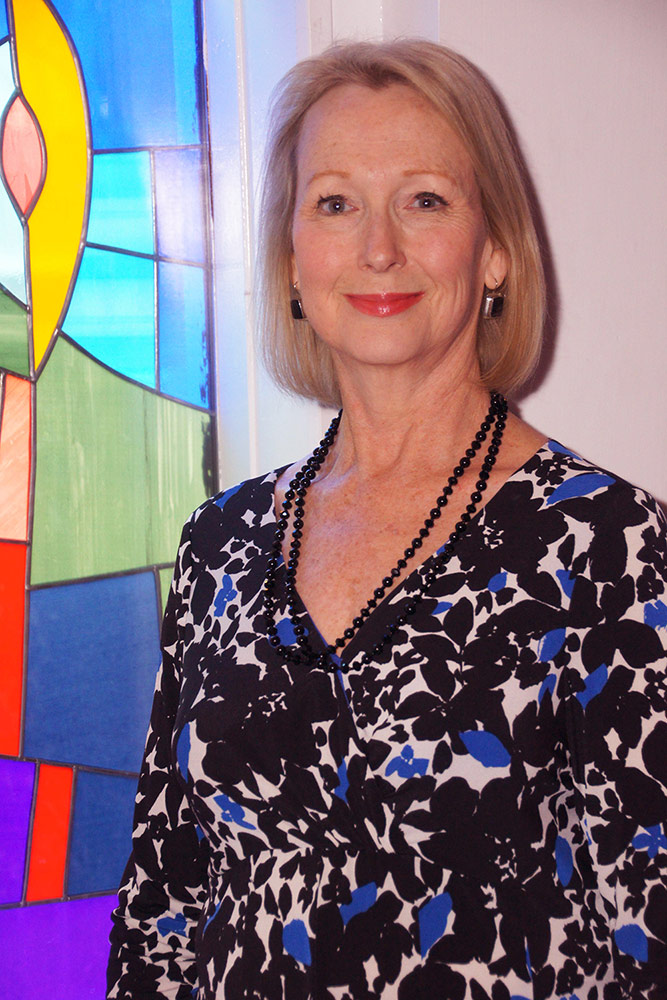Scherler’s Work, Teaching Music to Shelter Students, Nominated for International Award
April 5, 2017
When the summer of 2016 came along, Dr. Kathy Scherler, assistant professor of music education at Oklahoma Baptist University, had big plans. Rather than taking the summer off to slow down and unwind, she created something beautiful, using her knowledge and talents, driven by her passion and love for music, and focused on transforming the lives of children who needed to experience something beautiful to help them through difficult circumstances.
In June 2016, Scherler founded the Oasis Summer Music Camp. The camp provides music instruction to children and young adults in the Mosaic domestic violence shelter, located in the Dallas-Fort Worth metroplex. The shelter is a transitional home for women and their children who are victims of sex trafficking or domestic abuse.
She developed a music curriculum based on the five music rights of the International Music Council (IMC). The five music rights support, “The right for all children and adults to express themselves musically in all freedom; to learn musical languages and skills; and to have access to musical involvement through participation, listening, creation, and information.” The final two rights include, “The right for all musical artists to develop their artistry and communicate through all media, with proper facilities at their disposal, and to obtain just recognition and fair remuneration for their work.”
As a result of that work, she has been nominated for the IMC’s Music Rights Award. The IMC is a United Nations Educational, Scientific and Cultural Organization (UNESCO) council comprised of music committees in 70 countries.
The IMC Music Rights Awards are given to programs or projects that support in an exemplary way one or more of the five music rights enunciated by the council. The Music Rights Awards are competitive and selected by a committee that evaluates the submissions of individuals and groups whose work furthers the council’s focus on musical rights.
Scherler was inspired to create the camp by a personal tragedy.
“I became acquainted with the shelter while reading a story in my university alumni magazine, but my motivation for volunteering was personal,” she said. “My 25-year-old niece was a bright and courageous warrior who worked on behalf of sex trafficking victims with her New York law firm and other agencies. We had recently lost her to melanoma. This was my way of continuing her legacy in some small way – and honestly, a way to work through my own grief.”
She contacted the shelter to find out if they were interested in music activities for the residents. Her goal was to promote self-esteem and positive artistic experience in a general music class setting. They were very interested, and the director told her that a children’s camp was held in the summer which provided enrichment activities for the younger residents. She then scheduled her first visit and music camp.
She brought in numerous instruments, including a large keyboard, several rhythmic instruments, hand drums, eight different xylophones and sheet music for various age groups. She taught students from ages 4 to 17, encompassing the entire spectrum of musical knowledge and ability. She witnessed a spark and joy in the students that transcended their life circumstances and engaged them into the process of experiencing and making music.
The students made a strong impression on Scherler through their desire to make music.
“One factor that was distinctly different from a regular public school music class was that each student seemed hungry to learn about music,” she said. “They were not required to attend the music camp and could come and go as they pleased. But all of the students present at the shelter eagerly gathered early in the sunroom and looked forward to participating in music making and learning.”
The experience deeply impacted her and taught her much about the power of music.
“After over 30 years of teaching music, I learned something new at the summer music camp: that music is a basic form of human expression and often brings hope to the most marginalized of communities,” she said. “In these seemingly routine music classes a transformation took place. Students tapped into their own ability to increase their self-esteem. They created power and enablement from their rhythms, their voices, and their bodies. They needed this music. It was their way of participating again in a social and individual way that was positive, creative, and valued. They owned it. I was merely a bystander.”
Upon presenting a paper describing the shelter music camp at the Music Council of the Three Americas in San Juan, Puerto Rico, last fall, Scherler's work was nominated for the Music Rights Award by Dr. Gary Ingle, executive director and CEO of the Music Teacher's National Association.
Plans for the 2017 summer camp include incorporating more instruments and the contribution of lesson plans by OBU music education majors.
To read Scherler’s detailed narrative about her experiences leading the camp, view her story at www.newmusicbox.org/articles/little-band-of-dreamers.
Scherler coordinates the music education program in the Warren M. Angell College of Fine Arts and is in her third year of teaching at OBU. She earned a Bachelor of Arts in vocal performance and teacher certification from Cameron University. She then earned a Master of Music in vocal performance from Texas A&M University in Commerce, Texas. She also earned a Doctor of Philosophy in music education at the University of North Texas. Prior to joining the OBU faculty, she served as assistant professor of music at Midwestern State University in Wichita Falls, Texas, and Cameron University in Lawton, Oklahoma. She served as visiting assistant professor of music at the University of Texas at Arlington. She has presented research at numerous international and national conferences, and remains active as a soprano soloist.
For more information on the IMC’s Music Rights Awards, visit www.imc-cim.org/programme/music-rights-awards. To learn more about Mosaic Family Services, visit mosaicservices.org.
